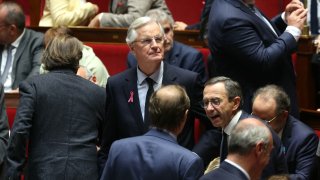
French Prime Minister Michel Barnier (C) ahead of his general policy statement to the French National Assembly in Paris on October 1, 2024. Barnier, a right-wing former EU Brexit negotiator, was appointed three weeks ago by French President to bring some stability after the political chaos created by a hung parliament that resulted from snap elections this summer.
- France's new and already beleaguered government is set to present its 2025 budget on Thursday amid an ongoing fiscal crisis for the euro zone's second-largest economy.
- The budget is being widely previewed as an "austerity" budget that will see the government of new Prime Minister Michel Barnier present tax-hiking and cost-cutting measures that could rile all major parties.
- Barnier has already given a flavor of the measures the conservative, centrist government are likely to propose including higher taxes on big business and steep spending cuts to combat France's yawning budget deficit.
France's new and already beleaguered government is set to present its 2025 budget on Thursday amid an ongoing fiscal crisis — and a brewing political one — for the euro zone's second-largest economy.
Watch NBC6 free wherever you are
The budget is being widely previewed as an "austerity" budget that will see the government of new Prime Minister Michel Barnier present tax-hiking and cost-cutting measures that could rile opposition parties on both the left and right, and even the centrists that put him in power.
In his inaugural speech to the National Assembly on Oct 1., Barnier gave a flavor of the measures that the conservative, centrist government is likely to propose including higher taxes on big business and steep spending cuts to central government in order to combat France's fiscal crisis.
Get local news you need to know to start your day with NBC 6's News Headlines newsletter.
Barnier then revealed that the government is planning to tighten fiscal policy by 60 billion euros ($65.9 billion) or 2% of GDP next year in a bid to reduce the country's deficit to around 5% of GDP in 2025, down from an expected 6.1% this year.
Of that 60 billion euros, around 40 billion euros is expected to include spending cuts from within central and local government, including a six-month delay to the indexation of pension payments, while the other 20 billion euros will come from higher taxes on "wealthy individuals" and "large companies."
The budget, set to be presented to parliament by new Finance Minister Antoine Armand, comes as France is already the subject of an excessive deficit procedure by the European Commission, given that its budget deficit far exceeds the 3% of GDP (gross domestic product) level to which EU member states are meant to adhere.
Money Report
Having asked for more time to submit its longer-term budgetary plans to the Commission, as new EU fiscal rules require of countries with higher debt-to-GDP ratios, Barnier's government is reportedly expected to take this step within the next few weeks.
Barnier told France's parliament last week that it would take until 2029 — two years later than originally promised — to get the country's deficit in line with EU rules.
The 2025 budget is the first real domestic test for the PM, who has inherited something of a poisoned chalice, with France's fiscal challenges and warring political establishment providing the backdrop to the new government after several months of political uncertainty in the country.

Barnier was appointed prime minister by President Emmanuel Macron after his ill-fated decision to call an inconclusive snap election in June, with the right-wing National Rally (RN) winning the first round of the vote and leftwing New Front Populaire (NFP) prevailing in the second round.
After months of political horse-trading, Macron appointed the conservative Barnier as prime minister, provoking fury from the leftwing alliance who felt that the election result was "stolen" from them. While leftwing lawmakers have already filed a no-confidence motion against Barnier — which failed to pass in a Tuesday vote — the right-wing National Rally is taking a "wait-and-see" approach, warning that Barnier is a prime minister under surveillance."
In sum, Barnier's government is a fragile one and vulnerable to predatory challenges from the left and right of the political spectrum. If the latest budget reverses Macron's pledges to resist tax hikes on large businesses, it could also fall foul of the president that put Barnier in office.
'Austerity' budget
If the measures are confirmed when the budget is presented to the National Assembly on Thursday, it will show that France is heading for fiscal tightening "comparable in scale to the austerity implemented in many countries during the euro-zone crisis," according to Andrew Kenningham, chief Europe economist at Capital Economics.
He warned in analysis last week that there was a danger that the measures could put a significant dampener on economic activity in France.
"The budget is reportedly based on a forecast for GDP growth of 1.1% this year and next ... But such a large dose of austerity may make even 1.1% growth difficult to achieve," he said in emailed analysis.
"Finally, even if the budget is passed and does not dent economic growth too much, France's fiscal position would still be precarious. The deficit would still be 5% of GDP next year and the EU will be looking for a reduction to 3% by 2027," Kenningham said.
"So France would still need more austerity beyond next year, against a background of a weak minority government and with the 2027 presidential elections getting ever closer," he noted.
Political weakness
The budget is the first main test for Barnier's government, which is made up of mainly of representatives from Macron's centrist bloc and Barnier's center-right Republicans party. With no majority, the government is now largely reliant on opposition parties that could thwart it at any moment.
To that end, Tuesday's no-confidence motion brought by the leftwing bloc showed how Barnier's government is at the mercy of the far-right National Rally, which had said it would abstain from the vote in order to give the government "a chance," according to leader Marine Le Pen said.
Carsten Nickel, deputy director of research at Teneo risk consultancy, noted that the administration will remain vulnerable to challenges from the left and right, and that the budget might even have to be forced through if it faces significant opposition.
"The government might struggle to find sufficient support [for the budget]. It might, therefore, revert to article 49.3 of the constitution, the rule that stipulates that a bill is passed without a vote unless the National Assembly passes a no-confidence motion against the government," Nickel said in emailed analysis.

"Macron used this tool to pass his controversial pension reform, but back then, he could disincentivize MPs from passing a no-confidence motion by implicitly threatening the dissolution of the National Assembly, triggering early elections. Since his own decision for the snap polls held in June and July, however, Macron cannot dissolve parliament until next summer," Nickel noted.
As a result, left and right opposition parties would be weighing up the risks associated with voting with or against the government — as well as the unpalatable possibility of having to vote together to bring down Barnier in future, Nickel said. Both parties' aversion to working together to do so might give Barnier's government a reprieve, for now.
"For the RN, it might be risky to be seen as a force associated with a politically chaotic situation in which no budget is passed, the current government is brought down, and new elections to resolve the stalemate are not possible before the summer of 2025," Nickel flagged.

He added that Le Pen's goal remains to be seen as a responsible actor in the run-up to her renewed presidential candidacy in 2027.
"The leftist alliance, conversely, owes its name and its existence to the idea that the values of the republic must be defended against the surge in the far-right vote ahead of this summer's snap elections. This backdrop increases the political cost of voting with Le Pen against a moderate (if center-right) government. These coordination issues between the far right and the left might buy Barnier some time," Nickel said.






